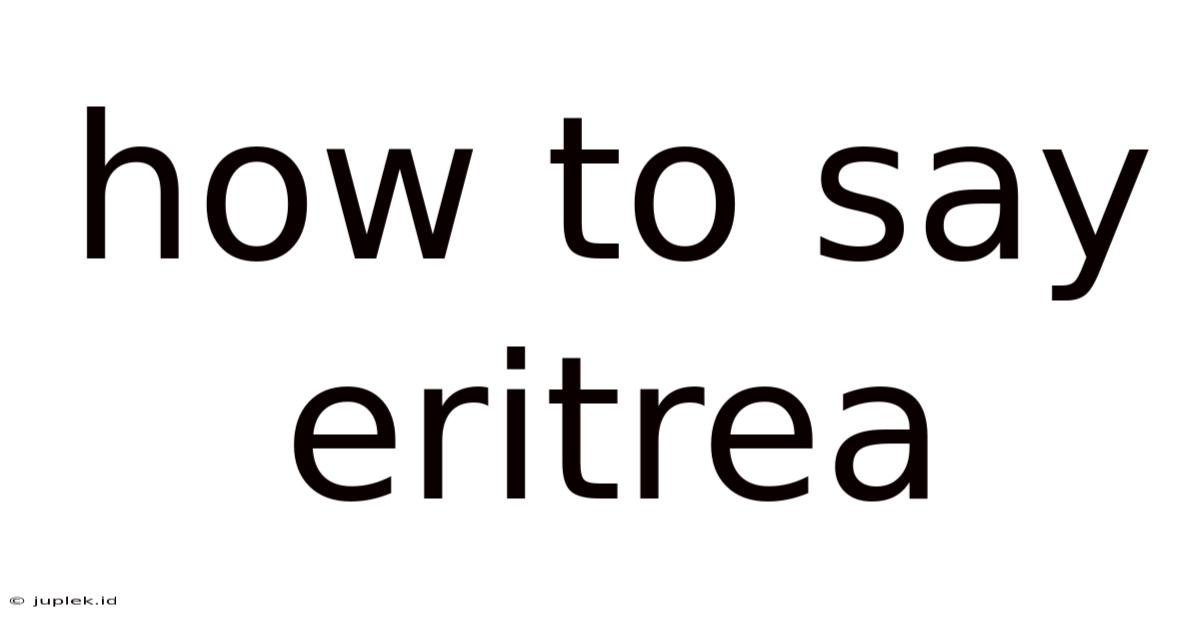How To Say Eritrea

Discover more detailed and exciting information on our website. Click the link below to start your adventure: Visit Best Website meltwatermedia.ca. Don't miss out!
Table of Contents
How to Say Eritrea: A Deep Dive into Naming, Language, and Identity
The simple question, "How to say Eritrea?" unravels into a fascinating exploration of language, culture, and the complexities of national identity. While the answer in English remains simply "Eritrea," understanding the nuances of its pronunciation and the linguistic landscape of the nation itself reveals a richer tapestry of meaning.
Pronunciation: The Sounds of Eritrea
The most straightforward answer to "How to say Eritrea?" involves mastering its pronunciation. In English, the emphasis falls on the first syllable: Er-i-TRE-a. The "Er" sounds like the "er" in "err," the "i" is short as in "pin," "TRE" rhymes with "tree," and the final "a" is a short "a" as in "cat." Practicing the pronunciation slowly, focusing on each syllable individually, is crucial for achieving accuracy.
However, the reality is far more complex than this single phonetic transcription suggests. The pronunciation is influenced by regional accents and individual speakers. While the English pronunciation is widely understood internationally, it's important to note that it's an approximation. The true essence of the name is found within the languages spoken within Eritrea itself.
Tigrinya and Tigré: The Indigenous Voices
Eritrea's linguistic landscape is diverse, with nine recognized national languages. However, Tigrinya and Tigré, two closely related Ethiopic languages, hold significant cultural weight. Understanding how these languages pronounce and conceptualize Eritrea offers a deeper understanding of its identity.
Unfortunately, a precise written transcription of the Tigrinya or Tigré pronunciation of "Eritrea" is challenging without using specialized phonetic notation. However, we can offer some insight:
- Phonetic Approximations: The sounds will likely be closer to the original roots of the name, which may involve subtle differences in vowel and consonant sounds compared to the Anglicized version. Expect variations in intonation and stress patterns.
- Contextual Understanding: The name "Eritrea" itself has a historical context deeply intertwined with the Tigrinya and Tigré languages and cultures. The nuances in pronunciation will reflect this historical context and cultural significance.
- Regional Variations: Even within Tigrinya and Tigré speaking communities, regional variations in pronunciation might exist, leading to subtle differences in the way the name is spoken.
The Etymology: Unveiling the Name's Origins
Delving into the etymology of "Eritrea" offers crucial context. The name originates from the Greek word "Erythraia," meaning "red." This refers to the Red Sea, which borders the country to the east. This historical connection to the Greek language and the geographical landmark further adds layers to the understanding of how the name is perceived and pronounced.
This historical connection also explains why the pronunciation in many other languages mirrors the English pronunciation – many European languages adopted the name directly or indirectly from Greek, resulting in similar phonetic interpretations.
Beyond Pronunciation: The Cultural Significance
The act of saying "Eritrea" is more than just a phonetic exercise; it's an act of acknowledging a nation's rich history, diverse culture, and complex identity. The various languages spoken, the historical influences, and the geographic location all contribute to the way the name is perceived and articulated.
Understanding the nuances of the name allows for a more respectful and informed engagement with Eritrean culture. It's not simply about saying the words correctly; it's about understanding the weight and significance behind them.
The Impact of Colonialism and Globalization:
The current English pronunciation of "Eritrea" is largely a product of colonial influence and subsequent globalization. While the name ultimately derives from a Greek term descriptive of the geography, its widespread adoption in its current form reflects the impact of Western languages and historical power dynamics. This is a common phenomenon across many formerly colonized nations where European linguistic norms influenced the way place names are pronounced and written internationally.
Modern Implications:
In the modern context, the question of how to say Eritrea is not just about pronunciation but about representing a nation's identity accurately and respectfully. The emphasis should be on understanding the cultural significance of the name and acknowledging the linguistic diversity within Eritrea.
Conclusion: A Deeper Appreciation
Simply learning how to say "Eritrea" in English is just the beginning. A deeper understanding necessitates exploring its etymology, considering its pronunciation within Eritrean languages, and recognizing the historical and cultural factors that have shaped its usage. By approaching the question with sensitivity and curiosity, we can move beyond the simplistic act of pronunciation and engage more meaningfully with Eritrean culture and identity. This enriched understanding fosters respect and appreciation for the nation and its people. The next time you say "Eritrea," remember the story behind the name—a story of history, language, and the enduring spirit of a nation.
Further Exploration:
To further deepen your understanding, consider exploring:
- Ethnologue: This website provides detailed information on the languages of Eritrea.
- Academic Resources: Research papers and books on Eritrean history and linguistics will offer invaluable insights.
- Eritrean Cultural Centers: Connect with Eritrean communities and organizations to learn more directly from those with firsthand knowledge.
By engaging with these resources and fostering open dialogue, we can continue to learn and grow in our appreciation of Eritrea and its rich cultural heritage.

Thank you for visiting our website wich cover about How To Say Eritrea. We hope the information provided has been useful to you. Feel free to contact us if you have any questions or need further assistance. See you next time and dont miss to bookmark.
Also read the following articles
| Article Title | Date |
|---|---|
| How To Say I Went To School In Spanish | Apr 08, 2025 |
| How To Say What Is This Meaning | Apr 08, 2025 |
| How To Say I Love You To My Best Friend | Apr 08, 2025 |
| How To Say Lijar | Apr 08, 2025 |
| How To Say Megan Rapinoe | Apr 08, 2025 |
